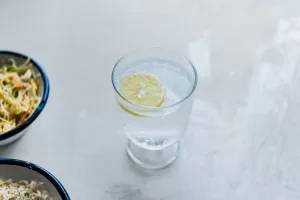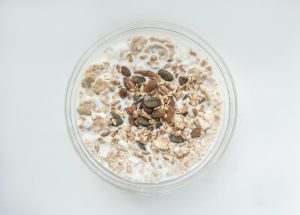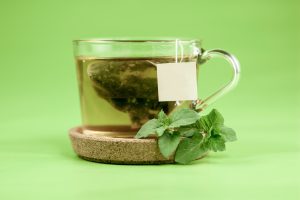Diet
Transitioning from Summer to Fall

Although it remains deftly hot and humid, according to the traditional calendar and evidenced in the shorter days and longer nights, we now find ourselves in the transition between summer to autumn.
Summer corresponds with the heart and central nervous system, autumn with the lungs and immunity, but each quarterly transition of the seasons corresponds with the gut and microbiome, thereby further underscoring the importance of digestion in engendering all other organ systems. This one might be most directly significant, as in Chinese medicine’s cycle of the five elements earth is “mother to” metal, which is to say the stomach is primarily connected to pulmonary health. Anyone who’s ever suffered with an asthma attack due to dairy consumption or sleep apnea due to a weight problem can attest.
To compile the challenges posed by American diets and grocery options, we are simultaneously confronted with the humidity, which might further aggravate pre-existing dampness in one’s gut, depending on their constitution, diet, and body type. As always, I recommend going gluten, dairy, sugar, and alcohol free as much as possible.
To avoid gluten, there is always rice or great gluten free pasta brands now, such as Glutiniete. To avoid dairy, you can occasionally sprinkle nutritional yeast on foods and/or make vegan parmesan cheese with this simple recipe:
To avoid sugar I recommend increasing your tolerance for dark chocolates, and/or eating spoonfuls of nut butters with a touch of maple syrup or honey. If you must have alcohol, then vodka, tequila, mezcal, and organic wines are preferable. People often forget (especially when seeking a buzz) that grapes are always on the dirty dozen list, which means their inorganic versions are ridden with pesticides.
Those are a lot of DONT’s, I realize. As for DO’s:
- Eat a warm breakfast with protein: Eggs, oatmeals, congees, etc.
- Sweet potato, sweet potato, sweet potato! An excellent digestive aid and coming into season in fall. I like to roast them either with salt, pepper, and garlic, or cinnamon and maple syrup. For the latter I add sliced apples for my toddler in the last 15 minutes.
- Small amounts of fermented pickled foods, such as kimchi, sauerkraut, or pickles for their naturally occurring probiotics.
- Pu-Erh tea instead of green in the morning, also for its naturally occurring fermentation. Green tea, even when consumed hot, has a cold quality that can harm weak stomachs.
- Hot ginger, licorice, and/or barley tea in the evenings.
Finally, in our classical texts it is said that excessive standing harms the kidneys, excessive celebration harms the heart, and excessive sitting harms the stomach. What is meant by the latter is something the ancient Chinese understood and has only in recent generations become common knowledge in the west: sedentary lifestyles compromise metabolism. No matter how well we eat, it won’t much matter if we never get up and move.
Which Sparkling Waters are Safe?

I don’t know many adults who don’t love sparkling water. I don’t know whether bubbles are having a generational popularity surge, or I’ve just reached that age where friends are enjoying it as a preferable vice in lieu of soda, beer, or other intoxicants we’ve all but ditched for better health. I’m pretty sure it’s both factors, and especially ever since the quieter life of parenthood and middle age, my wife and I both anticipate with great pleasure, our respective “sparklings” once our toddler is finally asleep for the night.
First, the obvious: Is sparkling water healthy?
Yes and no. My teacher, Dr. Suzanne Robidoux, suggests that people who gravitate incessantly to sparkling water probably suffer with a great deal of dampness in their stomachs. The carbonation causes gases to move, which helps to temporarily dissolve the dampness, and beyond being delicious, they feel better. Take note of what you’re eating when you have a strong craving for these gases—it is probably a damp-causing food. Conversely, people who feel bloated or uncomfortable in drinking the bubbles probably suffer with a “dry stomach,” one that is lacking in healthy fluids and/or digestive acids, and can’t handle the gases as well.
This informs us that (the gases in) sparkling water has a drying effect, which is not the worst thing if taken in moderation, but if over-indulged in over time, can have deleterious effects. Let’s be honest: Nobody actually believes these often flavored, commercial sparkling waters could possibly be as clean and neutral for our organs as plain, room temperature water, right? My opinion is as long as we limit ourselves to 1-2/day and are additionally giving to our bodies plenty of plain, clear water, we should be fine.
With that said, there are recent reports that many sparkling waters are laden with PFAS, or polyfluoroalkyl substances, which are manmade chemicals that have been around only since the 1940’s. Nicknamed, “forever chemicals,” they are thought to not break down in the human body and accumulate over time, potentially causing a wide array of serious diseases. These chemicals are found on non-stick pans as well as pizza boxes, as if the white bread, mozzarella, and inorganic (nightshade) tomato sauce wasn’t inflammatory enough.
Knowledge is power, and fortunately these same recent reports have informed us of which major companies’ waters tested positive for such chemicals, and which tested negative. Apparently, brands to avoid include Perrier, La Croix, Poland Spring, Bubly, Polar, and Topo Chico, once topping the charts with levels of 9.76! So, if you go to a Mexican restaurant, you’re probably better off with tequila than a fresh bottle of Topo Chico water.
Safe brands include Spindrift (which uses real fruit to flavor!), Mountain Valley (which has previously been ranked the cleanest water in the country, bubbles or not), Pellegrino (the classic!), Waterloo, and Sound.
I would post a link to some of the articles I referenced to get this information, but there are so many that are so easy to search online. I recommend doing so if you love your daily bubbles and wish to read more. Hope all are enjoying the summer!
Breakfast Congee Ideas

For anyone who is vegan, sensitive to eggs, or just dislikes them, here is a breakfast idea I’ve been experimenting with, both for the sake of variety and, well… experimentation.
In China, (white) rice congee is a common breakfast, often with egg and pickled vegetables, although I realize in the States rice is rather vilified for being a simple carb and high on the glycemic index. While this might be the case, it is also a food that is very gentle on the stomach and internal organs, which from our perspective aids in absorption and digestion, and in the proper dosages can be beneficial. However, for those who can’t get past the glycemic index, I recommend using quinoa, millet, or amaranth.
1 cup of your grain of choice
5 cups of liquid (if you’re going to make the sweeter, I recommend some kind of dairy-free milk—if you’re going for the probably healthier, more Oriental style I recommend just water or either vegetable, beef, or chicken broth) Oils don’t mix as well with the sweet flavors so if you’re making the sweeter version be sure to stir often so as to avoid sticking to the pot.
Boil and simmer about 15-25 minutes, or until it is the consistency of porridge.
Treat the sweet version like you would oatmeal: Top with berries, granola, as little maple syrup as you can discipline yourself to, cinnamon, and/or nuts if you like.
For the Asian version I recommend leftover vegetables and/or pickled cabbage or kraut. Plus, an over-easy or boiled egg if you want the best of all worlds.
Enjoy warm if possible! For those of us with babies or toddlers, we long for the days when we will return to eating hot food.
Whatever you eat, EAT BREAKFAST. I cannot stress this enough. They said breakfast is the most important meal of the day because it is, not because grandma said it, but because science and biology do. Here is a link to an NIH study correlating the skipping of breakfast with increased insulin resistance and risk for diabetes: https://www.ncbi.nlm.nih.gov/pmc/articles/PMC7246451/
I like coffee as much as anyone, but coffee alone (or with a piece of toast) is not breakfast. Protein and/or fat should be consumed, preferably in great quantity.
Nor do I doubt the potential benefits of intermittent fasting, but it is more biologically aligned to skip dinner—not breakfast. If this is impossible, maybe a later breakfast, like 9am? Supposedly, any longer than 2-3 hours after waking constitutes “skipping breakfast,” which is to say the insulin resistant mechanism is set in motion by that time.
If you have no appetite for breakfast this probably indicates your dinner being not fully digested and some metabolic syndrome at work. Please reach out—or try licorice and/or ginger tea 🙂
Chinese Medicine on Fainting, Dizziness

A friend of mine recently expressed having experienced great bouts of dizziness and fainting during the third trimester of her last pregnancy, which was in the dead of summer and was thus not surprising. I felt bad to hear of her struggles, but grateful that it inspired an idea for a new entry, on how Chinese medicine views fainting and dizziness, whether in pregnancy or not, and how we can treat or prevent it.
As with any Chinese medical diagnosis, the specifics get complicated, but we can still relatively easy to simplify into a couple of broad strokes. With any manifestation of dizziness, whether orthostatic, vertigo, passing out, or anything else, we are considering patterns of either blood deficiency, dampness, or a combination of the two, the latter of which obviously being the most difficult to treat. The final one is where your toddler at home forces you to “dance” with her around the house by spinning endlessly, for which there is no cure.
Blood Deficiency: More common in vegans, vegetarians, and pescatarians (most likely descending order), more common in women (especially while pregnant), the elderly, or anyone on long-term medications, which compromise the body’s absorption and capacity to produce blood. There is either a lack of cerebrovascular fluid or its flow and the head becomes faint.
Recommended treatment is herbs and moxibustion (acupuncture not as effective here), red meat or eggs, and earlier bedtimes.
Dampness: More common with obesity, more common in men, and/or people who consume a lot of alcohol, sugar, dairy, or raw foods. The microbiome grows congested with fluid retention, so the pathway by which our cellular energy carries healthy fluids to the brain is obstructed. “The clear yang qi cannot rise,” as we say, and our clarity or stability suffer.
Recommended treatment is minimizing all of the aforementioned foods, herbal medicine for 1-3 weeks to purge fluid retention, and acupuncture, especially along the vertigo line along the scalp located directly above the top of the ears. Note, this point will not be as effective on blood deficiency patterns, who are suffering a pattern of “deficiency,” not “excessive damp,” which responds better to aggressive manual treatment. As for self-care, drink hot ginger tea and black teas until symptoms subside.
Combination Blood Deficiency/Dampness: This is most common in pregnant women and very difficult to treat, because to nourish blood we must generate fluids, but to resolve dampness we must purge it. Not to mention the fact that we must be careful with purging fluid retention in pregnant women, since the fetus is ultimately a form of fluid retention—albeit an adorably magical one.
Dizziness and vertigo are serious conditions, not generally life threatening, although potentially dangerous when leading to the physical risks that accompany fainting. As always, Chinese Medicine can have much to offer in the way of hands-on treatment, internal medicine, and recommended self-care.
When in doubt: red meat, eggs, ginger tea, good rest, and steamed vegetables for the dampness.
Is Green Tea Healthy (for you)?
 In the western world we are often guilty of over-polarizing and labeling. This political viewpoint is good, that one is bad, this diet is healthy, that one is not. Further on that point, one food is healthy—while that one is not.
In the western world we are often guilty of over-polarizing and labeling. This political viewpoint is good, that one is bad, this diet is healthy, that one is not. Further on that point, one food is healthy—while that one is not.
While there are many foods that can be oversimplified and universally agreed upon—refined sugars are pretty much always bad and steamed vegetables good—most others depend on the dose, the patient, and time of year. For example, red meat in the winter for an anemic girl trying to conceive is eons more advisable than it is in the summer for an overweight male alcoholic trying to tame his heartburn. Also from a Chinese medical perspective, eating 5-6 ounces of red meat 1-3 times a week alongside vegetables will have an infinitely different systemic effect than 16 ounces 3-5 times a week alongside bread.
Green tea and kale have earned great reputations in the west, polarized as “good,” labeled “healthy,” and presumed to help anyone who consumes them, no matter the body type or time of year. From a Chinese medical perspective: False.
Almost anyone who’s ever drank green tea on a completely empty stomach has experienced the nausea or queasiness its bitter properties can induce. Bitter foods and herbs, while integral to a healthy diet and our pharmacopeia, are harsh on the stomach and less advisable for “Tai Yin” patients—those with weaker, more vulnerable stomachs. Such people generally do better with hot black teas, such as pu-erh or Earl Grey.
When written into herbal formulas, bitters are generally dosed lower and balanced with acrid and/or sweet-flavored herbs. This doesn’t mean to always consume your green tea with sweets, but it is that much more encouraged to never be drank cold or on an empty stomach. In fact, green is the one kind of tea we might encourage to take with honey—that is as long as you’re not the snob that I am, in refusal to corrupt any tea (or coffee) with outside flavors.
The same principle applies to kale. While undoubtedly possessing of all the literal health benefits it claims to, kale is a bitter green, therefore a bit more difficult to digest than other veggies. For this reason, it is important to always consume cooked, with warming spices, such as garlic, onions, or ginger to aid in proper metabolism. I’m not sure about honey on kale—maybe in the context of a salad—although in that case the raw food might cancel out any benefits of the honey. Better to have it with rice or yams to balance your “formula.”
According to teachers, green tea is best taken hot, more in the summer than winter, and more after a night of red meat and/or alcohol to sort of “drain” the heat that these foods create in the gut. Personally, I almost always drink green tea the morning after I go to baseball games! In these instances, the benefits far outweigh its “side effects.”
Please fall victim as infrequently as possible to the idea that certain foods are always healthy or unhealthy. This is rarely the case, also rare that the opinion of the general American public on anything health-related is accurately informed. If you have any questions about a particular food, please don’t hesitate to ask. And don’t take too much kale or green tea.


